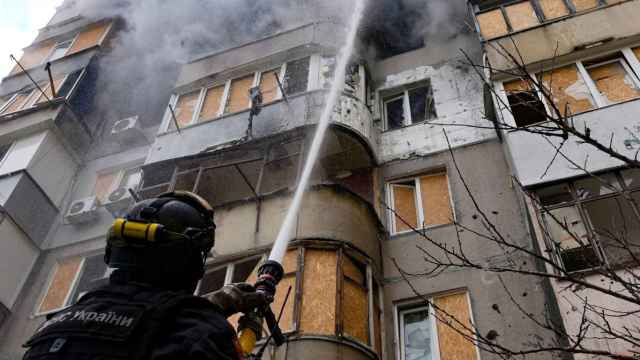LONDON — Fears that fires scorching forests near Chernobyl may reawaken dangerous amounts of radioactive fallout and propel it into the air are overblown, scientists say, and the actual health risks are very small.
In contrast, the smog that has clouded the air in Moscow is something worth worrying about, they say.
Radioactive contamination in the Bryansk region, polluted by radioactive dust from the 1986 Chernobyl reactor disaster, has substantially diminished over the past 2 1/2 decades.
"Most of the radioactivity is in the soil, which will not be affected by the fires, and only a small proportion is in the vegetation," said Jim Smith, an expert on Chernobyl and a specialist in Earth and Environmental Sciences at Britain's University of Portsmouth. "And of that, only a very small proportion … will get re-suspended in the smoke from the fires."
The Federal Forestry Agency said Wednesday that fires covering an area of 39 square kilometers had been registered in areas with forests polluted with radiation. The areas affected included the Bryansk region, which borders Ukraine, about 350 kilometers southwest of Moscow.
Both France's Institute for Radiation Protection and Nuclear Safety and Germany's Federal Office for Radiation Protection said Thursday that while some radiation was likely to be remobilized in smoke, the health risks were minimal and would have no impact on either Russia or neighboring countries.
"The fires do not have any radiological consequence for the rest of Europe and Germany, since the dispersion of the radioactive substances is regionally limited," the German organization said on its web site.
Even firefighters tackling wildfires are unlikely to run any added nuclear contamination risks. The amount of radiation in smoke would be only a fraction of the original fallout, scientists say.
"Of the total radioactivity in the area, much less than 1 percent of it will be remobilized," Smith said in a telephone interview.
Maria Neira, the World Health Organization¹s director of public health and environment said the WHO had data from controlled burning experiments conducted in the region in recent years and these suggested no reason for concern.
“We know from these experiments that the redistribution and re-suspension of radionuclides [radioactive particles] will be negligible for people¹s health,” she said.
According to experts, the types of radioactive isotopes that might still be active in the Bryansk area include strontium-90 and cesium-137. These substances have half-lives of about 30 years, meaning that only about half the radioactive material emitted by Chernobyl is still around now.
"Even though the contaminated territories are affected by the fires in Russia, the situation would not lead to health concerns for the population, locally and in other countries in Europe," said France's Institute for Radiation Protection.
It said there might be a slight increase in radioactivity in the nearby environment because of re-suspension of cesium-137, "but it would be very much lower than the natural radioactivity."
Smith and Stig Husin, an analyst in emergency preparedness at the Swedish Radiation Safety Authority, said the main threat from the fires both locally and nationally in Russia was the choking smoke from forest and peat fires, as well as the smog that has clouded the air in Moscow on and off over the past week — all of which can cause lung and heart problems.
"I would be much more concerned about the smog in Moscow and the health impacts of that — not because of radiation, but because of people inhaling harmful air pollution," Smith said.
Husin said those living near the Chernobyl-contaminated areas where fires have been reported would be wise to protect themselves by staying inside or wearing masks.
"Naturally it would be good if you are living close to the fires to protect yourself from the smoke itself," he said. "If you do protect yourself, then naturally you protect yourself from the radioactive substances that may be in the smoke."
A Message from The Moscow Times:
Dear readers,
We are facing unprecedented challenges. Russia's Prosecutor General's Office has designated The Moscow Times as an "undesirable" organization, criminalizing our work and putting our staff at risk of prosecution. This follows our earlier unjust labeling as a "foreign agent."
These actions are direct attempts to silence independent journalism in Russia. The authorities claim our work "discredits the decisions of the Russian leadership." We see things differently: we strive to provide accurate, unbiased reporting on Russia.
We, the journalists of The Moscow Times, refuse to be silenced. But to continue our work, we need your help.
Your support, no matter how small, makes a world of difference. If you can, please support us monthly starting from just $2. It's quick to set up, and every contribution makes a significant impact.
By supporting The Moscow Times, you're defending open, independent journalism in the face of repression. Thank you for standing with us.
Remind me later.





